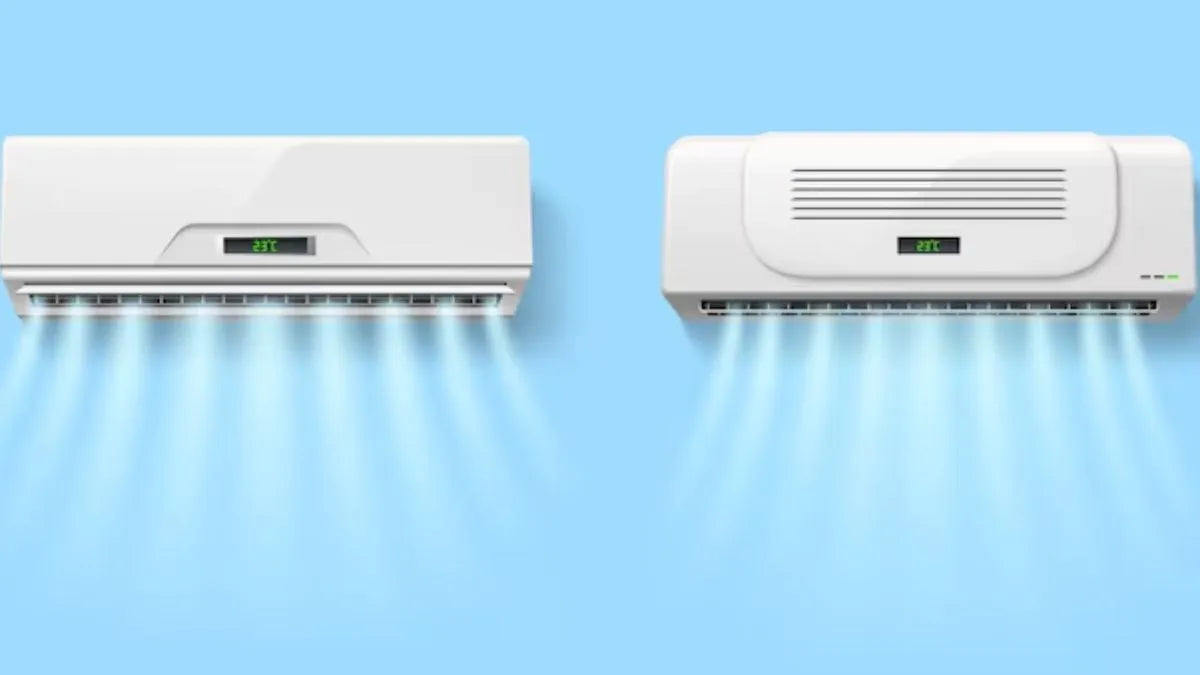
Which Is Better Split Inverter or Dual Inverter AC?
When choosing an air conditioner for your home, understanding the technology behind it is essential. The debate between split inverter and dual inverter ACs is common among homeowners looking for energy-saving air conditioning options.
Both models promise comfort, efficiency, and long-term performance, but which one truly stands out? Let’s explore their features, benefits, and performance differences to help you make the right decision.
What Is a Split Inverter Air Conditioner?

A split inverter air conditioner uses inverter technology in HVAC systems to regulate compressor speed based on cooling demand. Unlike traditional ACs that turn the compressor on and off repeatedly, inverter ACs run continuously but at variable speeds.
This results in better energy efficiency, stable room temperatures, and quieter performance. Split inverter systems are popular for their variable speed compressor, energy-saving capabilities, and relatively lower cost compared to dual inverter models.
Cost Comparison: Split vs. Dual Inverter AC
When it comes to pricing, split inverter ACs generally have a lower upfront cost. However, dual inverter ACs can save more money over time due to their superior energy efficiency and SEER ratings (Seasonal Energy Efficiency Ratio).
Dual inverter systems are designed with two rotors in the compressor, which ensures smoother operation and less power consumption.
Over time, this leads to lower electricity bills and quicker return on investment, especially for households in warmer climates where air conditioning use is frequent.
If you’re planning an HVAC installation, consider the long-term savings instead of just the purchase price.
Benefits of Dual Inverter AC Systems
A dual inverter air conditioner improves on the technology of standard inverters by providing faster cooling, quieter operation, and consistent performance. Here are some notable advantages:
-
Higher energy savings: Thanks to dual rotary compressors and better Energy Star certification ratings.
-
Enhanced cooling performance: Ideal for larger spaces that need quick temperature control.
-
Stable operation: The system adapts smoothly to load variations, ensuring consistent comfort.
-
Reduced noise: Dual inverter compressors minimize vibration and noise, creating a quiet operation air conditioner experience.
Dual inverter systems are a step forward for those looking to optimize energy consumption without compromising comfort.
Durability of Split Inverter Air Conditioners
Durability is another factor worth considering. A split inverter AC is built for reliability and longevity, often featuring a long lifespan AC unit design. These systems use high-quality components that can withstand frequent usage while maintaining stable performance.
However, dual inverter units often outperform in terms of motor efficiency and long-term durability because of their advanced compressor design. They also tend to operate with R-32 refrigerant, which is more eco-friendly and efficient.
In short, both models offer good durability, but the dual inverter leads slightly in terms of lifespan and reliability under heavy usage.
Energy Efficiency: Split vs. Dual Inverter AC
When it comes to energy efficiency, dual inverter air conditioners have the edge. With their dual rotors, they can adjust cooling output more precisely than single inverters.
This means the dual inverter consumes less power while maintaining consistent cooling, translating to noticeable savings on your electricity bills. On the other hand, a split inverter is still far better than a non-inverter AC but slightly less efficient compared to the dual model.
If reducing your carbon footprint and utility costs is your goal, the dual inverter is the smarter investment.
Smart Features in Dual Inverter AC Units

Modern dual inverter ACs are designed for the smart home generation. Many models today are IoT-enabled air conditioners, allowing you to control temperature and settings directly through your smartphone.
Features such as Wi-Fi connectivity, voice control compatibility, and automatic diagnostics make these ACs both convenient and user-friendly. You can integrate them with smart home systems like Alexa or Google Home for complete climate control.
Noise Levels in Split and Dual Inverter ACs
One of the biggest differences users notice is in noise levels. Dual inverter ACs are significantly quieter due to the balanced operation of their dual rotors.
The result is smooth airflow and minimal compressor noise, perfect for bedrooms or study areas. While split inverter ACs also provide quiet operation, they might generate slightly more vibration during rapid cooling.
If you value peace and quiet, a dual inverter will provide a more pleasant experience overall.
Choosing the Right AC for Your Home
Both split inverter and dual inverter ACs are excellent options, offering energy-saving air conditioning and reliable comfort. However, if you prioritize maximum energy efficiency, smart features, and quiet operation, a dual inverter is worth the investment.
On the other hand, if you’re on a budget and looking for reliable performance, a split inverter AC remains a solid choice.
Ready to Upgrade Your Home Cooling?
At Direct Solar Power, we offer cutting-edge, energy-efficient solutions like Solar Mini Split systems that combine cooling comfort with renewable energy savings. Explore our collection and bring sustainable comfort to your home today!
Frequently Asked Questions
1. What is the difference between a split inverter and a dual inverter air conditioner?
A split inverter AC has a single rotary compressor, while a dual inverter uses two, allowing smoother operation, faster cooling, and higher energy efficiency.
2. Which type of air conditioner is more energy-efficient: split inverter or dual inverter?
Dual inverter ACs are generally more energy-efficient due to their dual rotary compressor design, which minimizes power consumption.
3. Do dual inverter ACs operate more quietly than split inverter models?
Yes, dual inverter ACs are quieter because the dual compressor design reduces vibration and noise during operation.
4. Are dual inverter air conditioners more durable than traditional models?
They tend to last longer and operate more efficiently thanks to improved motor technology and refrigerant usage.
5. Can I control a dual inverter AC with a smartphone or smart home system?
Yes, most modern dual inverter models are IoT-enabled, allowing easy control via mobile apps or voice assistants.

Leave a comment